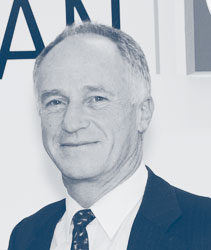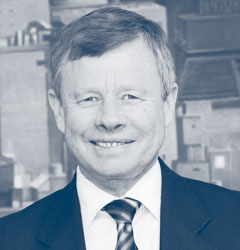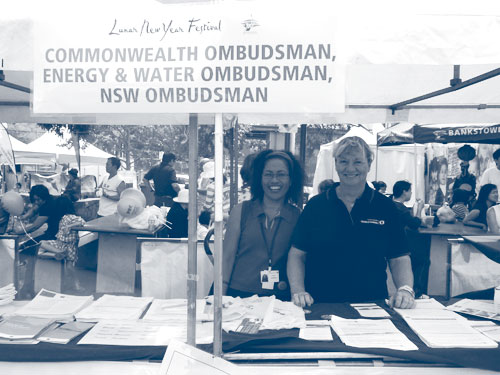Commonwealth Ombudsman - Annual Report 2009-2010 - Introduction
Introduction
On This Page
Foreword and A last word...
Foreword

Photo credit: Norman Plant
This past financial year has been one of change for the office. The office prepared for another new jurisdiction, the Canberra office moved to new premises, and we lost both the Ombudsman and one of the Deputy Ombudsmen.
Change is a fact of life in the modern bureaucracy, and that is a good thing. Over the past seven years that I have worked here we have seen a constant renewal of the office, new structures, new reporting, a new case management system, new procedures, new jurisdictions, significant staff turnover, and new IT and work systems. This change has allowed the office to remain highly relevant in a changing world, to adapt to a changing bureaucratic environment, changing government priorities, and changing expectations.
At the same time every change encompasses some loss. This is most starkly evident in the loss of Prof John McMillan AO from the role of Commonwealth Ombudsman, as he moves to a new challenge to become Australia's first Information Commissioner. During John's tenure the office has gone from strength to strength. Staffing has increased along with a substantial increase in roles and functions. I believe that this growth reflects the confidence that the government has in the office as a key element of Australia's accountability framework. It also reflects the success of the office in managing complaints and making a productive contribution to improving the quality, equity and efficacy of government administration.
The large increase in the number of 'own motion' investigations that the office undertakes reflects a broader move across the work of the office, towards finding solutions and fixing problems, rather than laying blame or simply identifying error.
John McMillan has led this change for the last seven years and his term as Ombudsman is sure to be assessed as one of outstanding achievement. At the same time John has, himself, always emphasised the need for renewal and fresh approaches, even in the leadership of the office. I strongly support the idea that an office needs regular changes of leadership if it is to
continue to be at the leading edge of reform and improvement. New ideas, attitudes and directions are to be welcomed, not feared.
Unfortunately, John's departure was not as smooth a transition to new leadership as it might have been with the almost simultaneous departure of Dr Vivienne Thom in April 2010 (tenure March 2006–August 2010), the other Deputy Ombudsman. Vivienne's deep and extensive public service experience balanced John's administrative law expertise and strategic vision. While Vivienne is sure to make an outstanding contribution as the Inspector-General of Intelligence and Security, she will be sorely missed from the team at the Ombudsman's office.
Despite these changes the future of the office is sound. The staff and senior leadership team represent the highest levels of capacity, integrity and commitment. This report attests to the strong contribution that the office makes while providing a platform for the new Ombudsman to bring change. This will enhance the office's capacity to continue to adapt and reform itself as the context in which it works changes.
The office remains a key part of the accountability framework for the Australian Government. It has been an immensely rewarding privilege to have been Deputy Ombudsman for seven years and to finish my career filling the role of Commonwealth Ombudsman.
Ron Brent
Acting Commonwealth Ombudsman
March 2010–June 2010
A last word ....

Photo credit: Arthur Mostead
In March 2010, after seven years as Commonwealth Ombudsman, I left to take up a new position as Australian Information Commissioner. Much of the activity described in this Annual Report for 2009–10 occurred during my final year as Ombudsman. I welcome the opportunity to add a few words to the report.
It was a special honour to head an office that enters a fourth decade of helping people and improving government. Four groups that I would like to acknowledge have contributed in different ways to maintaining that tradition.
The first are members of the public—tens of thousands each year—who approach the office for assistance. Public faith in the Ombudsman's office is essential to its credibility and effectiveness in persuading government agencies to provide remedies and to improve administrative processes. Government is strengthened when people are prepared to question decisions that concern them. The right to complain has more substance when it is regularly exercised.
Next are the government agencies that with few exceptions worked cooperatively and respectfully with the Ombudsman's office to resolve complaints and facilitate investigations. It can be uncomfortable and distracting for agencies to give priority to resolving individual complaints when there are strong and competing pressures to complete other work set by government. It is reassuring that agencies generally accept that effective complaint resolution is an element of their obligation of public service. A key achievement of the ombudsman institution is that it can work with agencies while holding them publicly to account. Agencies play an equal role in crafting that subtle relationship.
A third group that has lent strong support are other ombudsman offices in Australia and the Pacific region. A vibrant network now exists of parliamentary and industry ombudsman offices that regularly share ideas and work together on joint projects. This mutual assistance has enhanced the effectiveness of individual offices and raised the profile of the ombudsman institution. Far more attention is now paid within government to the vital role of ombudsman and similar oversight agencies in the accountability and integrity framework of government.
Lastly, I make special mention of the wonderful professional support and commitment I received from Commonwealth Ombudsman staff during my term. I was particularly struck by the growing interest among officials across government to work in an independent complaint agency during their career in public service. Dealing first hand with enquiries and grievances from members of the public gives a different perspective on government. My belief is that all public servants should engage in that role at some time in their career. I commend the Commonwealth Ombudsman staff who shared that belief over the last seven years.
Prof John McMillan AO
Commonwealth Ombudsman
March 2003–June 2010
Feature: Working with others
From road shows and fair days, to conferences and roundtable discussions, our staff were involved in 109 outreach activities across all states and territories in 2009–10.
We spoke to more than 34,000 people directly, which represents a 22% increase on the previous year. This growth in our connectedness was made possible by working collaboratively with other ombudsman and community organisations.
In NSW, our office is an active member of JOIN (Joint Outreach Initiative Network), the Good Service Forum and WISH (Woolloomooloo Integrated Services Hub).
In Western Australia we work with the WA Ombudsman, Freedom of Information Commission and the Office of Health Review to deliver the Regional Awareness and Access Program, taking a road show of our services to regional and remote centres of this vast state.
Our Adelaide, Perth, and Hobart offices are co-located with the state Ombudsman. Our Brisbane office is physically co-located with the Queensland Ombudsman and various state government agencies concerned with anti-discrimination, community health and the welfare of young people. In 2009–10 we shared in the development of an inter-agency complaint portal (http://www.complaints.qld.gov.au) and an information brochure translated into 15 languages. These are called It's OK to complain, and aim to improve community awareness and understanding of our services.
The Commonwealth Ombudsman is a member of the Australian and New Zealand Ombudsman Association (ANZOA). Teaming with other ANZOA member agencies, our office presented outreach stalls at 17 universities and technical colleges in the first semester of the 2010 academic year.
For many reasons collaboration makes good sense—book marks profiling both our office and state ombudsmen is a positive example. It addresses scarce resourcing and helps to build a strong community of practice within the broad network of complaint-handling and accountability agencies.

Commonwealth Ombudsman staff at the Lunar New Year Festival
